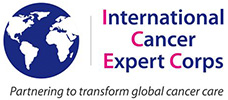Overview
The underlying principle of ICEC is to establish a sustainable corps of experts who have sufficient time and resources to provide mentorship to healthcare workers within an underserved community so that over a mutually developed timeline the team in the lower-middle income facility can provide the full spectrum of cancer care at international standards. To achieve sustainability and a critical mass of expertise, it is essential that this can be done as an integral part of a career and fit within family life. In the ICEC model, the majority of the time will be spent on weekly teleconferences with periodic travel opportunities among mentors and mentees to enhance person-to-person relationships and cultural exchange. Unlike the current situation where global health efforts are considered either a sidelight or even a detriment to a career, under the ICEC model a career in global health will become a reality and with it restore and enhance the opportunity for altruistic service as a component of healthcare careers.
ICEC Hubs
– ICEC is working with a number of cancer centers and private practices to establish the global network of ICEC Hubs in developed countries. The names of the initial Hubs will be posted on a website global map. At this time, these Hubs are providing in-kind assistance, advice and key connections to potential ICEC Centers in their overseas or indigenous regions of interest.
– ICEC is pleased to include private practices as Hubs, a unique aspect of ICEC, thanks to our pioneers. The power of collaboration in cancer care as opposed to potentially wasteful competition will be the subject of an editorial to a leading journal in radiation oncology (in preparation by N Coleman). As ICEC is a model of broad partnership across academia and private practice, a similar concept will be aired for career development for translational science in radiation oncology in the US in this editorial. The need for new approaches for sustainable clinician-scientist careers is based on discussions at an NCI Workshop “The Future of Radiation Biology” in May, 2016 in which the lack of sustainable careers in basic research has many similarities to that facing those interested in global health careers.
Experts & Career Path:
Expert Panels are being formed with professionals involved in cancer care: radiation oncology, medical oncology, physics (with partner organizations, e.g., Medical Physicists without Borders and the American Association of Physicists in Medicine), pathology (or with partner networks), radiology (also potentially with partner networks), pharmacy, nursing, palliative care as well as surgical/gynecological oncology. We will also begin to organize Expert Panels is supporting activities including economics and survivorship.
– Inspired by discussions at the Stanford course on Human Rights and with other retiring internists, ICEC will establish a General Medicine Expert Panel. This is important both to assist with cancer care but also to work on establishing a sustainable healthcare infrastructure as outlined in the General Section.
ICEC Centers and Associates:
– There are ongoing discussions with potential ICEC Centers and Associates in preparation for our initial funding and pilot projects. ICEC is developing a map that will include these sites.
Indigenous populations:
– Initial activities with indigenous populations builds on the “Walking Forward” program for American Indians in South Dakota (Hub and Center). We have had discussions with colleagues in Canada who are working with their First Nations populations and also with another potential partner with which to pilot a university-tribal partnership in the US. We were honored to have Gloria Letendre, Bonnie Healy and Lea Bill, from the Alberta First Nations Information Governance Centre join us in Washington, DC at our reception. We look forward to working with them to identify additional ways we can help bolster their efforts. Furthermore, we aim to work with the Union for International Cancer Care on addressing needs of indigenous populations.

